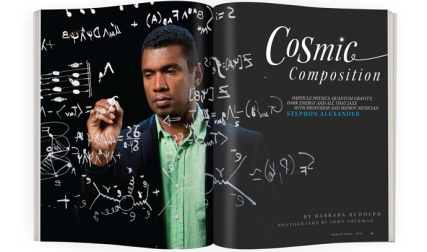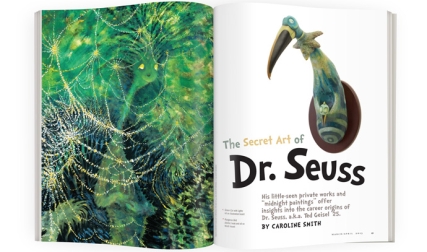“Can we say that, according to Kant, acts don’t have moral worth if they are motivated by feeling?” asks Hayden Kvamme ’14, one of 13 students enrolled in “Hume, Kant, and the Enlightenment.” Chris Hauser ’14 raises his hand to ask about Kant’s distinction between God’s agency and God’s cognition.
Professor Timothy Rosenkoetter, who has traveled with the students to Scotland for the Dartmouth philosophy department’s fall term foreign study program (FSP) at the University of Edinburgh, explains that Immanuel Kant (1724-1804) indeed proposed a universal a priori moral system based entirely on rational principles. Although for God cognition and agency are indistinguishable, rational finite beings need motivation to move from rational understanding to action. “That’s where feeling comes in,” says Rosenkoetter, “but we’re not supposed to act morally in order to feel good.”
The students are so deeply immersed in questions about abstract moral principles that time and place don’t seem to matter. If, however, they turned toward the large glass windows of their classroom, they would see pedestrians tightening their coats against the Scottish autumn chill, skateboarders jumping on the steps of Bristo Square and the late-afternoon sun setting on the university buildings and the churches of Old Town.
For the study of philosophy, place may not seem all that relevant, but Rosenkoetter says it is inspiring to teach in the city where David Hume (1711-76) lived. “I think students can identify with the young Hume,” says Rosenkoetter. “He studied at this university, and when he was about the same age as my students he came up with the idea of A Treatise of Human Nature.” Rosenkoetter, a Kant scholar, explains that Kant and Hume are interesting to juxtapose because, on first reading, they seem to be opposites. While Kant tried to construct a philosophical system that was purely rational and independent of human emotions and experiences, Hume was an empiricist who famously pronounced reason “the slave of the passions.”
“But,” says Rosenkoetter, “I lead students through close readings that show that ultimately these philosophers are not as far apart as it first seems.” He argues that Kant ultimately acknowledged that moral feeling is necessary to compel humans to act according to the Moral Law, and Hume ultimately allowed a role for reason in his moral philosophy.
“Hume saw himself as an empirical scientist whose subject was human emotions,” says Rosenkoetter. “His moral philosophy revolves around sociality and the idea that we can’t think in isolation and can’t remain independent of one another in our passions and our senses.” Hume was a very sociable person, deeply involved in Edinburgh society, which makes it even more interesting to read his work in his hometown.
Although it’s not clear if Hume ever read Kant’s work, Kant acknowledged that Hume’s criticism of a priori reasoning was a major challenge to his own philosophy, and he credited Hume with awakening him from “dogmatic slumber.” Rosenkoetter, 42, who joined the faculty in 2010 after having worked as a visiting instructor from 2004 to 2006, finds both Hume and Kant challenging for students: He’s convinced Kant would not get published if he submitted his critiques today. Hume, on the other hand, says Rosenkoetter, is very easy to read, but he digresses too much and obscures his thesis by giving too many examples.
As a student Rosenkoetter, a graduate of Harvard with a master’s from the University of Pittsburgh and a Ph.D. from the University of Chicago, was put off by Hume’s commonsensical approach. “It sounded like platitudes, and that’s not why I wanted to study philosophy,” he says. “I wanted to read really unusual, crazy, interesting theories.” He was intellectually more satisfied with the brilliant ambition of Kant, whom he sees as one of the last grand philosophers who tried to create a single, comprehensive system of philosophy, even if he ultimately failed. Over time Rosenkoetter has grown to appreciate Hume. “Now I realize there can be truth in common sense,” he says.
Students in the philosophy FSP took not only the Dartmouth course but also enrolled in two philosophy courses at the University of Edinburgh. Because those courses usually met only once a week, there was plenty of time for weekend travel to European cities—as well as the Scottish Highlands and isles.
Steffi Ostrowski ’14, a double major in philosophy and computer science, says she expected to prefer Hume to Kant, but thanks to Rosenkoetter’s enthusiasm, she is now more drawn to Kant. “Hume will make a point,” she says, “but then gives all these exceptions, so that his theory seems very ad hoc. Maybe that’s because he would say there is no unifying theory possible.”
In addition to Rosenkoetter’s course, Ostrowski took “Philosophy of Skepticism” and “Philosophy of Science” with University of Edinburgh faculty. “To engage in philosophy you have to talk about it, and we talk about philosophy nonstop,” she says of the FSP. “It’s like philosophy camp.”
Kvamme agrees. “In Hanover,” he says, “you sometimes hold back because you don’t want to bore people, but here you know everyone in the program is interested just as much as you are.” Kvamme, who plans to enroll in seminary and become a pastor after graduation, came to Dartmouth intending to major in math and religion, but when he took his first course in philosophy, he was hooked. In Edinburgh he enrolled in “Philosophy of Math” and “Philosophy of Science” and audited two courses at the School of Divinity. Kvamme likes Kant’s moral philosophy because it attempts to offer guidelines, while Hume remains a more detached observer.
Near the end of the term the students took a break from papers and exams to join a walking tour of Edinburgh led by Andrew Mason, a professor of philosophy at the University of Edinburgh. From Old Town—the dense, medieval heart of the city perched on a hill that rises above the stately, 18th-century New Town, where Hume resided at the end of his life—the tour continued to a number of places important to Hume: the Old College, where Hume enrolled as a student at age 12; the library where Hume worked after he was denied a teaching position at the university due to suspicions he was an atheist; a theater where Hume was rumored to have participated in a play; and the Poker Club, the society where Hume used to meet with his friends to talk about philosophy and politics. The last stop was Hume’s grave, a stone tomb in a graveyard once at the edge of the city.
Hume’s legacy in the city made an impression on Kvamme. “The history of thought goes very deep here,” he reflects. “To feel that all kinds of people—not just Hume—have been here, having the kind of conversations that we’re having, makes it easier to relate to Hume and imagine the kind of life he might have lived.”
Recommended Reading
Groundwork for the Metaphysics of Morals, by Immanuel Kant, edited and translated by Allen W. Wood (Yale University Press, 2002). This is a translation of Kant’s first major work in moral philosophy, accompanied by four essays in which leading philosophers address broad themes in Kant’s ethics.
Hume on Morality, by James Baillie (Routledge, 2002). A very readable introduction to Hume’s ethics.
How to Read Hume, by Simon Blackburn (Granta U.K., 2008). A lively and accessible introduction to Hume’s entire philosophy.
Stanford Encyclopedia of Philosophy. A free, online resource that contains several excellent articles under the Hume and Kant headings.
Judith Hertog is a frequent contributor to DAM. She lives in Norwich, Vermont.




